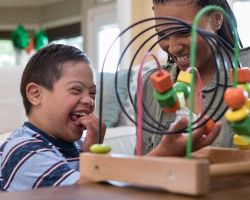Health library
Back to health libraryCaring for a child who has Down syndrome

Children who have Down syndrome need some extra care to reach their full potential.
Every child needs personal attention to truly thrive. But when your child has Down syndrome, extra attention can be especially important in helping him or her become as healthy, strong and independent as possible.
These suggestions from the National Down Syndrome Society (NDSS) can help:
Start early. As soon as you find out your baby has Down syndrome, start looking into early intervention programs. These programs of physical therapy, exercise and other activities help children with Down syndrome develop the fullest possible range of movement, language, social and self-help skills. Early intervention programs can start shortly after birth and continue until age 3.
Go to a specialist. Find a doctor who's experienced in caring for children with Down syndrome. According to NDSS and the Centers for Disease Control and Prevention, kids with Down syndrome are at higher risk for health conditions, including heart defects, hearing and vision loss, breathing problems, digestive issues and childhood leukemia. A doctor who has experience with Down syndrome can help ensure your child receives the appropriate attention.
Keep your child involved. Routine involvement in group and community activities will help your child grow up well-adjusted and well-equipped to participate fully in family and community life as an adult.
Do your homework. When it's time for your child to enter school, explore all the options. Your child may be able to attend regular classes, with or without special instruction. Research has shown that this approach can offer substantial benefits to children with Down syndrome, and to their classmates who don't have Down syndrome.
Prepare for your child's future. Once your child turns 18 and you're no longer his or her legal guardian, some extra legal protections can be a great help. Consider creating a special-needs trust to help meet your child's financial needs, or drawing up a letter of intent that details your child's day-to-day and overall medical needs. Financial and legal experts in special-needs planning can help you with these and other long-term arrangements.
Be optimistic and realistic. Your attitude toward your child can affect his or her growth and development. Try to be accepting, optimistic and realistic. If your expectations are very high or very low, it can affect your child's self-esteem and ability to make progress.
Expect the best
Thanks to advances in medical care and social attitudes, people who have Down syndrome are living longer and doing more than ever before. Employment, semi-independent living and traditional education are increasingly common for people who have the disease.
Ask your doctor about your child's outlook and options—Down syndrome symptoms can vary greatly from one child to the next. You may also want to research common challenges and possible solutions for children with Down syndrome. The NDSS website is a great place to start.
Reviewed 10/24/2025
